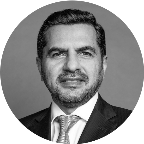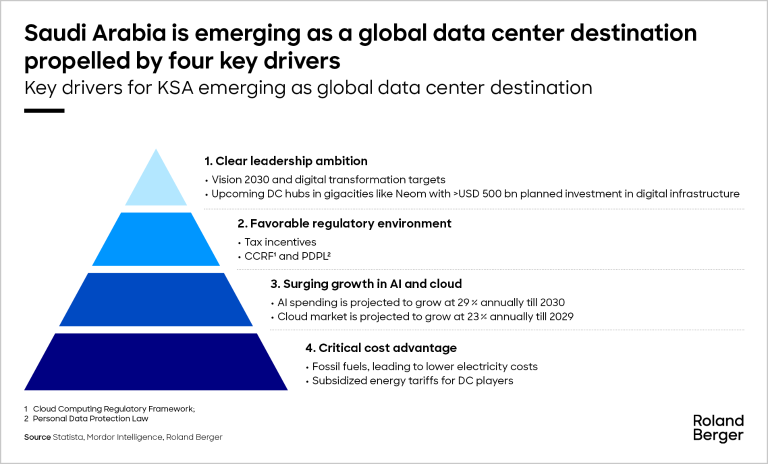Roland Berger advises companies on industrial goods and services, combining outstanding industry expertise and excellent technical know-how.


Unlocking the Data Center opportunity in KSA
By Jawad Shaikh
Why is KSA poised to emerge as a global data center hub?
As the backbone of the digital economy, data centers are rapidly becoming one of the most critical infrastructure elements of the 21st century. Similar to electricity and gas infrastructure and fiber and wireless telecom networks, data centers are now considered vital infrastructure due to their role in powering our digital world. Furthermore, their ability to store critical data within national borders is paramount for ensuring data sovereignty and security.

Data centers are often clustered in centralized locations called “hubs” because they offer several advantages: enhanced network performance, cost efficiency due to economies of scale, access to a skilled talent pool, and potential regulatory benefits. The global landscape of these data center “hubs” is undergoing a seismic shift, driven by evolving technological demands, regulatory changes, and shifts in energy availability.
"With the leadership’s commitment to innovation and substantial investments in technology, a favourable regulatory climate and significant cost advantage, Saudi Arabia is poised to become a leading player on the global data center stage and the transformative hub for the region's digital economy."
For example, the Amsterdam and Dublin data center hubs are experiencing significant changes, with moratoriums on new developments due to their commitment to sustainable development. Alderman Reinier Van Dantzig, Amsterdam’s Deputy Mayor, highlighted the issue by stating: “Space is limited in Amsterdam. Not only real space, but also grid space for electricity”. Data center construction currently faces a “no, unless” scenario, meaning new data centers will only be approved if they directly benefit these cities and meet stringent new environmental standards. Amsterdam's moratorium targets hyperscale data centers - large facilities with high energy demands. The moratorium on permits for these facilities lasts for nine months. In Dublin, EirGrid, the state-owned electricity provider, has implemented a de facto moratorium. They are not approving new grid connections for data centers until at least 2028, halting new construction. Meanwhile, other hubs like London and Paris are experiencing a regional migration of data center developments to their outskirts. This shift is primarily driven by the increasing difficulty in obtaining permits and navigating bureaucracy within the core areas of these major cities. These examples highlight the dynamic nature of the data center infrastructure market and its continuous adaptation to global trends and challenges.
With these dynamics at play, the Kingdom of Saudi Arabia (KSA) is poised to capitalize on the burgeoning demand for data centers. This surge in demand represents a significant opportunity as the market remains underserved — KSA’s data center capacity is 50-80% lower than leading regions such as the EU, USA, China, Singapore, and the UAE. KSA finds itself at a pivotal juncture where it can meet its domestic needs and position itself as a key global or regional hub. This opportunity arises from several advantageous factors, including KSA’s leadership ambition, favorable regulatory environment, surge in AI and cloud technologies, and lower energy costs, making it an attractive destination for data center investments.
KSA: a fertile ground for Data Centers
KSA rapidly emerges as a key player in the global digital economy, propelled by strategic initiatives and robust infrastructure development. The country's commitment to innovation and substantial investments in technology, along with several other factors, make it an ideal destination for data center investments:
1. Clear leadership ambition
Saudi Arabia's ambitious Vision 2030 initiative exemplifies the Kingdom's broader digitalization efforts. This initiative is bolstered by upcoming data center hubs in gigacities like Neom, with a planned investment exceeding $500 billion in digital infrastructure.
Tonomus, Neom’s cognitive technology company, is actively working to advance a data center hub in Neom, constructing the required digital facilities and forging partnerships with key international players.
For example, Tonomus has already launched Neom’s first digital communications facility in Oxagon to meet the growing demand for cloud services. In addition, Tonomus signed a partnership with Oracle to be the first tenant of their hyperscale data center, ZeroPoint.
2. Favorable regulatory environment
Saudi Arabia’s proactive approach to creating a conducive regulatory environment is about attracting investment and fostering innovation. By implementing frameworks like the Cloud Computing Regulatory Framework (CCRF) and the Personal Data Protection Law (PDPL), the Kingdom is signaling its commitment to data privacy and laying down a solid foundation for sustainable digital growth. This also indicates a forward-thinking approach that prioritizes economic development and ethical considerations.
According to Jawad Shaikh, Partner at Roland Berger and Head of the TMT practice for the Middle East, these new regulations signify Saudi Arabia's efforts to establish itself as a regional hub for cloud computing and data centers.
“Saudi Arabia has swiftly established the necessary regulatory framework to develop a robust data center industry. This initiative aims to motivate Saudi companies to transition to the cloud and attract international data center operators to the country.”
3. Surging growth in AI and Cloud
Increasing investments in artificial intelligence (AI) and cloud services drive robust data center infrastructure demand. The AI market in Saudi Arabia is expected to grow at a compound annual growth rate (CAGR) of 29% until 2030, while annual spending on public cloud services is projected to grow at a CAGR of 23% until 2029.
As AI becomes more pervasive, ethics, equity, and accountability questions come to the forefront. Saudi Arabia has an opportunity to lead in AI adoption and shape a responsible and inclusive AI ecosystem that prioritizes human welfare and societal well-being.
Significant developments are underway in Saudi Arabia, signaling a promising future for the AI market. For example, PIF established Alat, an AI fund that has pledged a whopping $100 billion to develop partnerships and build advanced AI manufacturing capabilities.
Additionally, large players are strategically partnering to drive AI innovation in the Kingdom. For example, Cognizant and Google Cloud announced a strategic partnership in the Kingdom to accelerate the adoption of cutting-edge technologies, with a strong focus on generative AI.
4. Critical cost advantage
One of the most compelling advantages for data center investors in Saudi Arabia is the lower energy cost. Saudi Arabia has a rich supply of fossil fuels, leading to a lower cost of electricity generation. For example, the average price for commercial consumers is around $0.08 per kWh, which is 30-50% lower compared to the global average. This significant saving can directly improve data center operators' profitability.
Saudi Arabia anticipates USD 15 Billion in data center investment
Driven by these factors, Saudi Arabia is expected to attract more than USD 15 billion in data center investments by 2030, aiming to increase its installed capacity from ~300 MW to ~1300 MW in 2030. Hyperscalers are taking note and are already moving ahead with investments.
Amazon, Microsoft, Oracle, and Huawei have announced major projects in the Kingdom. These projects total ~USD 10 billion in investment and will be used to build new cloud regions in the country.
Key success factors for data center operators and investors in Saudi Arabia
The potential for success in Saudi Arabia's data center market is significant, yet navigating this landscape requires astute strategic planning and execution. To capitalize on the Kingdom’s unique advantages and avoid pitfalls, data center operators and investors must focus on several critical factors:
1. Strong anchor tenants and partners
In the competitive arena of data centers, forming the right strategic partnerships with anchor tenants is not just advantageous—it's imperative. Anchor tenants can significantly influence the preferred architecture, such as the Uninterruptible Power Supply (UPS) type, shaping the overall business case. Strategic alliances, such as those between local telecom giants and global tech firms, can accelerate market entry and operational efficiency, providing a formidable edge in the marketplace.
For instance, large anchor tenants will favor distributed UPS systems to enable edge computing applications. These systems provide power backup closer to edge locations, ensuring low latency and high availability for critical applications. Additionally, distributed UPS architectures are more scalable, aligning well with the modular nature of edge data centers.
2. Right location
The ability to serve KSA and the wider MENA region is vital, particularly as new projects and cities emerge. Proximity between data centers is critical for cloud services and hyperscalers, ensuring efficient service delivery and redundancy. In an era where latency and connectivity can make or break digital services, the strategic location of data centers within KSA and their connectivity to regional hubs will determine their competitive advantage. Operators who master this geographical focus will be poised to dominate the regional market.
3. Scalability and efficiency
The design of data centers is evolving, especially with the increasing use of Graphics Processing Units (GPUs). GPUs require higher rack and power density and, due to their physical weight, necessitate that racks be placed on the ground rather than on traditional raised floors. This technical shift needs to be integrated into the planning and construction of new facilities. Data centers in Saudi Arabia that innovate with these design principles will be at the forefront of technological efficiency and capability, ready to support the next wave of digital advancements.
4. Operational excellence
Data centers must be designed to meet redundancy needs (Tier 3 – Tier 4) and address key energy considerations such as Power Usage Effectiveness (PUE) and CO2 emissions. Increasingly, there is a focus on green energy solutions and water management, including recycling and Water Usage Effectiveness (WUE). While KSA has initiatives underway, like those led by Acwa Power, which is driving initiatives to integrate renewable energy sources into data center operations, there is still room for improvement in incorporating green energy sources into data center operations in KSA.
5. Value-added services
In the rapidly evolving data center market, merely offering colocation services is no longer sufficient to maintain a competitive advantage. Providers must ambitiously move up the product and services value chain to fully capitalize on the data center boom. This transformation involves transitioning from simple colocation services to more value-added offerings, such as hosting, Platform as a Service (PaaS), Infrastructure as a Service (IaaS), security solutions, and AI computing with GPU-enabled servers. This strategic shift enhances revenue streams, solidifies market position, and drives technological leadership.
Conclusion
KSA stands uniquely positioned to emerge as a global hub for data centers due to several key advantages. These include its ambitious Vision 2030 initiative driving substantial investments in digital infrastructure, a favorable regulatory environment supporting innovation and data sovereignty, rapid AI and cloud technologies growth, and significantly lower energy costs than global averages. As other global data center hubs face constraints and regulatory challenges, KSA's proactive measures and vast potential offer a promising opportunity for investors looking to capitalize on the growing demand for digital infrastructure.
To succeed, investors should focus on strategic location selection, scalable and efficient facility design, operational excellence, including green energy solutions, strategic partnerships, and diversifying service offerings to meet evolving market demands. By leveraging these factors, stakeholders can position themselves at the forefront of KSA's burgeoning data center market and contribute to its transformation into a global digital powerhouse.
Roland Berger as your strategic partner for Data Center investments
Navigating the complex and rapidly evolving data center landscape requires expertise, strategic insights, and a robust implementation plan. Roland Berger stands ready to assist you in maximizing your investment in the data center market through our comprehensive suite of services, which range from identifying and assessing the feasibility of data center investments to full-blown due diligence with financial modeling and investment valuation. With our exceptional credentials in sustainability, we also assist with green energy and ESG strategies and execution plans.
Our portfolio of services include:
- Market research & market entry strategy
- Site selection & feasibility studies
- Technology and infrastructure advisory
- Sustainability and ESG studies
- Investment due diligence, financial modeling, and investment valuation
- Anchor tenant selection & negotiation
- Service portfolio expansion & revenue growth strategy
Unlock the full potential of your data center investment in Saudi Arabia. Contact Roland Berger today and schedule a consultation with our data center specialists.



![Data center installed capacity [MW IT load]](https://img.rolandberger.com/content_assets/content_images/captions/roland_berger_24_2503_data_center_opportunity_in_ksa_gt02_image_caption_none.png)
_image_caption_none.png)
